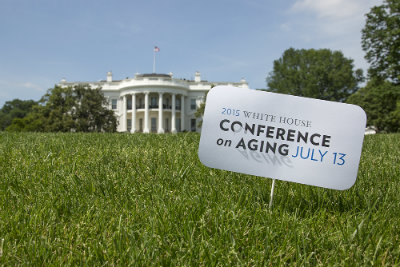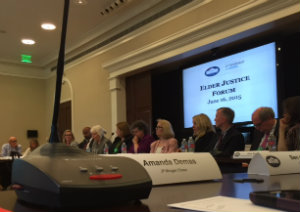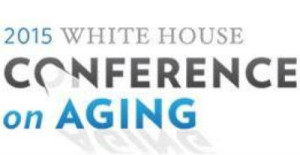 The White House Conference on Aging offers a special, once-a-decade opportunity to focus national attention on issues that the John A. Hartford Foundation has been working on every day for more than three decades. So I am honored and excited to be among those invited to attend this year’s gathering on July 13 with President Obama, national leaders, colleagues in the field, and people participating virtually across the country who will all join in a national conversation about our aging nation.
The White House Conference on Aging offers a special, once-a-decade opportunity to focus national attention on issues that the John A. Hartford Foundation has been working on every day for more than three decades. So I am honored and excited to be among those invited to attend this year’s gathering on July 13 with President Obama, national leaders, colleagues in the field, and people participating virtually across the country who will all join in a national conversation about our aging nation.
At the John A. Hartford Foundation, our focus is on better care for older Americans. We believe that improving the quality of care and the way it is delivered will result in better health for older adults and lower health care costs for the nation as a whole. “Healthy Aging,” one of four policy briefs drafted for the conference, addresses issues that are integral to the Foundation’s current grantmaking strategies, including managing chronic conditions, and prevention and treatment for diseases and behavioral health conditions.
I fervently hope that the national dialogue sparked by the conference will lead to more widespread recognition of the critical role to be played by health professionals with specific expertise in aging, and will support efforts to develop, test, and widely spread evidence-based models of care for older adults that achieve better health outcomes at lower costs.
I also am encouraged that the role of family caregivers and direct care workers are recognized in the conference’s “Long-Term Services and Supports” policy brief. We need national action to better support family caregivers who bear so much of the burden—emotionally, physically, and financially—for the care of older Americans today. We also need improved training and fair pay for the home health aides, certified nurse aides, and personal care attendants who make up the direct-care workforce that provides 70 to 80 percent of the paid, hands-on, long-term care for older adults in the U.S.
 President Terry Fulmer took part in the Elder Justice Forum, held June 16.
President Terry Fulmer took part in the Elder Justice Forum, held June 16.Having concentrated my professional research over the years on elder abuse and neglect, I am heartened that "Elder Justice" is another of the four subjects selected as a focus of the White House Conference on Aging. I am encouraged that the conference is shining a much-needed spotlight on this topic, and grateful for the opportunity I was given to participate in the White House’s June 16 Elder Justice Forum that examined how best to address and prevent elder abuse and financial exploitation. It is vitally important that we raise awareness of the signs of elder abuse, neglect, and exploitation, and that we enlist all Americans—especially professionals who have daily contact with older adults—in eradicating this scourge.
The final policy brief for the conference focuses on "Retirement Security," and includes recommendations to protect and strengthen Social Security and expand employer-based retirement savings options—issues that are important to all older Americans and to all of us working in the aging and health field.
 While I am truly looking forward to attending this year’s White House Conference on Aging, you don’t need an invitation to be part of it. You can watch the conference online from 10 a.m.-5 p.m. on Monday, July 13. Two of our grantees—the Hartford Center of Gerontological Nursing Excellence at Oregon Health & Science University and the Eldercare Workforce Alliance—are among groups all over the nation hosting Watch Parties to bring people together to view and discuss the event.
While I am truly looking forward to attending this year’s White House Conference on Aging, you don’t need an invitation to be part of it. You can watch the conference online from 10 a.m.-5 p.m. on Monday, July 13. Two of our grantees—the Hartford Center of Gerontological Nursing Excellence at Oregon Health & Science University and the Eldercare Workforce Alliance—are among groups all over the nation hosting Watch Parties to bring people together to view and discuss the event.
Conference organizers also are offering ways you can share your stories and issues, and Tweet your questions for panel members to answer, among other ways of getting involved.
It is my sincere hope that this decade’s White House Conference on Aging will help us find non-partisan public-private solutions that will move our nation closer to the goal of providing older Americans with the quality care, financial security, and opportunities to lead fulfilling and productive lives that they deserve.
